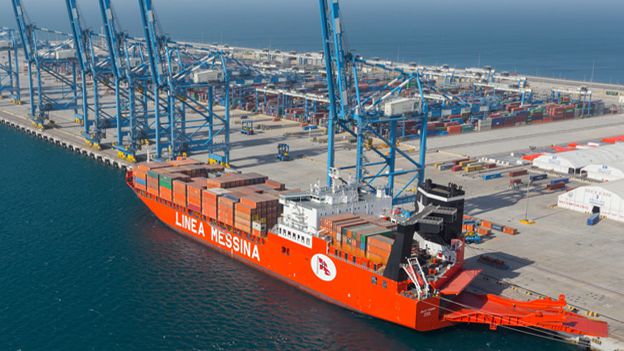Italian Maritime Companies Forge New Iranian Ties

During Iranian President Hassan Rouhani's goodwill tour of Italy, shipbuilder Fincantieri announced a major new partnership with its Iranian counterparts.
In a ceremony on Tuesday, attended by Italian Prime Minister Matteo Renzi and President Rouhani, Fincantieri signed a set of preliminary agreements with Azim Gostaresh Hormoz Shipbuilding (AGH), a subsidiary of state-owned Iran Shipbuilding and Offshore Industries Company (ISOICO).
The agreements outline a possible joint venture for construction of ships and rigs, plus repair yard work, and for technology transfer between the firms for vessel design and construction.
Fincantieri subsidiary Isotta Fraschini Motori, an engine and propulsion system manufacturer, also signed agreements related to Iranian procurement of 600 marine engines and 70 locomotive engines.
In announcing the deal, Fincantieri CEO Giuseppe Bono said that "we have once more demonstrated the ability to attract the industrial interest of one of the countries with the highest development potential in the world.”
Additionally, Ignazio Messina Lines is reportedly interested in exploring new ties with Islamic Republic of Iran Shipping Lines (IRISL). Messina operates a fleet of eight con/ro ships, the largest of the type, with service to West, East and North African ports, the Middle East and Northern Europe; partnership would give ready access to African markets for Iranian firms. Messina operates ro/ro service to and from Bandar Abbas, Iran, with first runs in 2005. In 2013 it came under pressure from a U.S. watchdog group for its transactions with a Bandar Abbas terminal operator.
Tehran is also said to have an interest in a long-term presence at Italian ports. Italian media report that IRISL has discussed options for terminal facilities at Genoa, La Spezia, Naples, Ravenna, Venice and Trieste, with details to be finalized in the near future. Italian media reported Tuesday of three new agreements signed between the Port of Trieste and Iranian entities.
The new deals come amidst widespread enthusiasm in the wider Italian business community – Italy was once Iran’s largest European trading partner – but also amidst warnings from legal advisors about the dangers of Iranian trade in the post-nuclear-sanctions era.
Maritime law consortium Ince & Co. issued a client memorandum Wednesday, suggesting that “it is important that anyone considering conducting business with Iran remains vigilant and continues to carry out appropriate due diligence on proposed counterparties, and seeks legal advice to ensure that they comply with any remaining restrictions and are suitably protected in their contracts.”
The consortium also advised careful attention to details of insurance and finance to avoid liabilities, and to be aware of Iran's high placement on the Corruption Perception Index (scoring 27 out of 100, where zero represents most corruption, and ranking at 130 out of 168 nations).
As more European companies move towards major investment and trade decisions with Iran, American legal experts say that they – and even more importantly, their bankers – will have to tread with caution.
Jimmy Gurule, a former Treasury Department official, told media that “foreign financial institutions need to be very careful [because], while they may not be running afoul of the nuclear sanctions because they've been lifted, doing business with Iran in a particular set of transactions may run afoul of counterterrorism sanctions,” unrelated to those lifted earlier this month.
The penalties for doing so may be stiff: last year, BNP Paribas was sentenced to probation and a $9 billion fine for helping clients evade sanctions on Iran, Cuba and Sudan, under provisions of the Trading with the Enemy Act.
"So what we are hearing from Europe is that although European sanctions are lifted, the banks, especially major banks which transact with the United States, are very cautious," said Nader Habibi, a professor of economics at Brandeis University.
